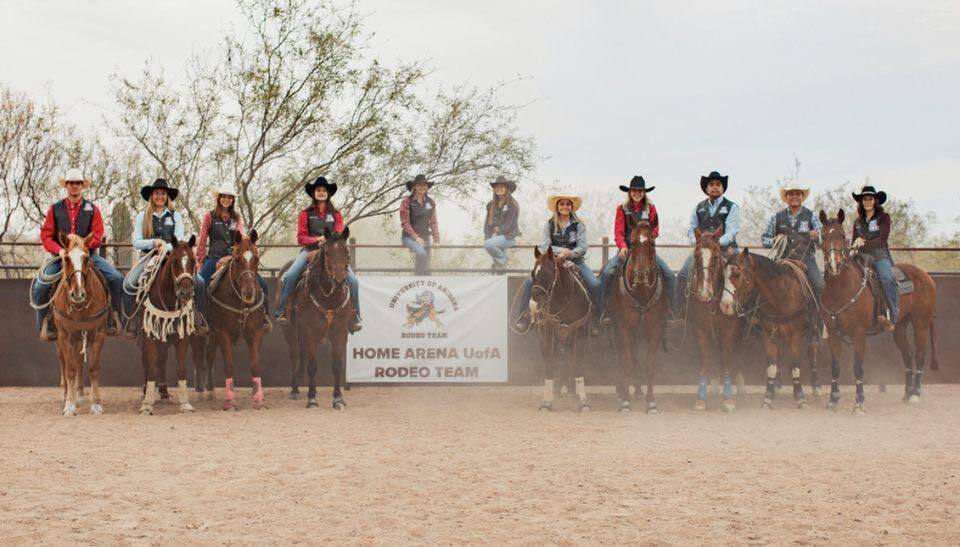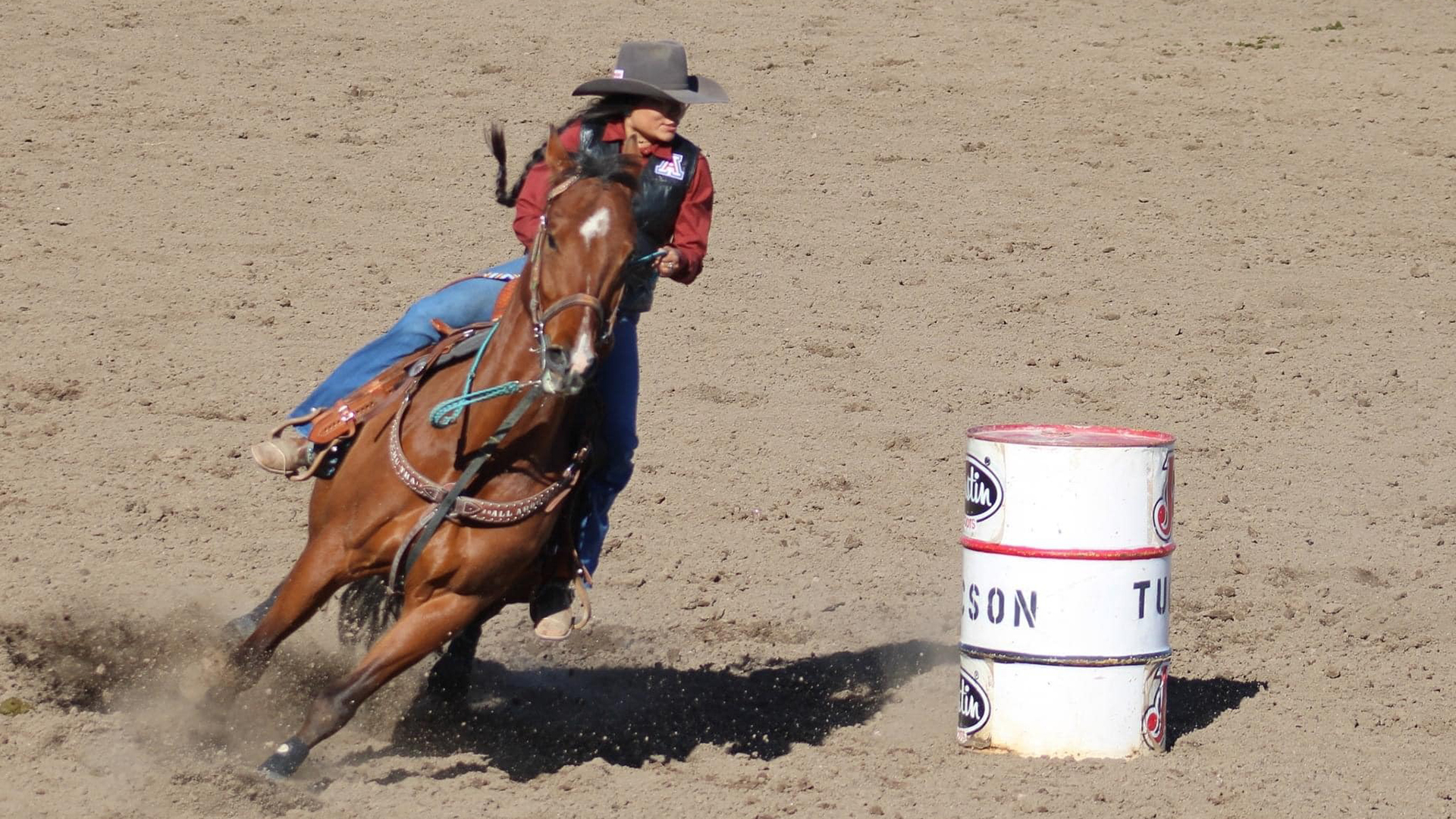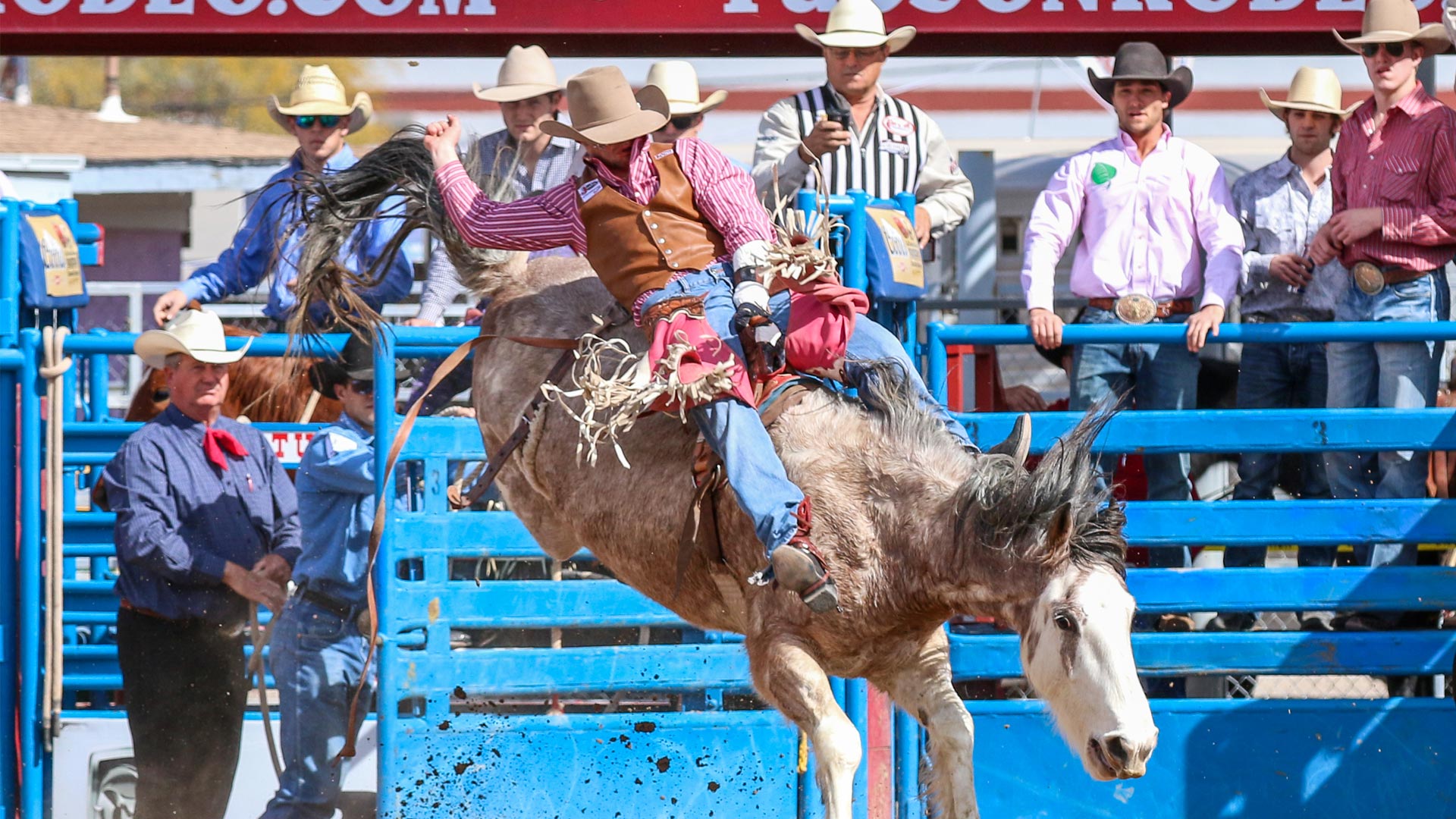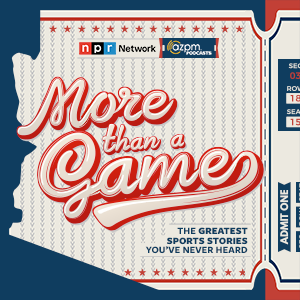
More Than a Game Season 2, Episode 3

On this episode, we start by meeting one of the students on the University of Arizona's collegiate rodeo team. Then we learn about the rivalry between two northern Arizona rodeos who claim spots at the sport's genesis. And last, we head to the final games for UA basketball in the Pac 12 conference.
More from More Than a Game
Episode Transcript:
[Music starts]
I'm Tony Perkins and this is More Than a Game, the podcast that takes you beyond the box score and tells the Arizona sports stories you've never heard.
On this episode, we head to the rodeo, learning about the sport from its roots to the modern college level. Then, the end of an era in Las Vegas.
[music fades]
TP: No one ever said rodeo was easy.
And a trip to Tucson's College Rodeo shows it's the truth.
This is the weekend after Tucson's legendary Rodeo Days.
Once La Fiesta de los Vaqueros is over and the professionals have moved off the grounds, the old stadium switches gears to a celebration of college rodeo.
University of Arizona freshman Jordan Carlson is taking part in it for the first time. She's going after a degree in Agriculture Business. But she's also a barrel racer from Mesa who's grown up around the rodeo circuit.
JC: "It's pretty good. I've made a lot of friends. It's fun getting to see all the new places I haven't gone before because it's a different circuit."
TP: The U of A's annual College Rodeo has been around for 85 years, starting just 13 years after the Tucson Rodeo was established in 1925.
Now it is part of the National Intercollegiate Rodeo Association's Grand Canyon circuit, a league that includes Cochise College, Central Arizona College, Mesalands Community College and New Mexico State University.
The NIRA has been around since 1949, and runs events at rodeo grounds all over the West. This year, the circuit has grown to stage events in the deep South, at places like Murray State University in Kentucky, and the University of Tennessee at Martin.
Rodeo is a club sport on the collegiate level, and it's one that hardly anyone hears about. But it's produced some of rodeo's all-time great professionals, riders like Ty Murray, an Arizonan who climbed to fame atop some of the toughest bulls in rodeo, and Dan Mortenson, a six-time World Champion saddle bronc rider.
Just as in stick and ball sports, the top athletes in rodeo advance to the highest competitive ranking, and the trip up the ladder can be filled with bumps and bruises.
Jordan Carlson, the U of A freshman, recognizes the potential for a painful path.
 UA Rodeo Team's Jordan Carlson.
UA Rodeo Team's Jordan Carlson.
JC: "I think we take the risk because we love what we do. So, the good outweighs the bad."
College rodeo brings individuals together as a team, as most sports do. But it also brings an extra element. Participants are keenly aware of the animals who are athletes in their own right. Horses, bulls, calves, even lambs are part of the action in rodeo, and the human participants must keep them healthy, too.
Carlson notes this is part of the activity that pulls everyone together.
JC: "We're all pretty close. Just being there for each other, we get to haul together, so it's a lot of fun when you're going 10-to-12 hours to a rodeo."
While big events like pro rodeo's National Finals are performed in front of a packed stadium and big television audience, the college rodeo circuit sometimes takes place only in front of family and friends, at least for now.
The National Intercollegiate Rodeo Association stresses the preservation of Western heritage alongside its role of developing collegiate athletes. As the energy and enthusiasm for the sport grows, the organization says college rodeo has yet to reach its peak.
Jordan Carlson believes the University of Arizona can be at the front of the line.
JC: "I think it's good that we're out here and we're showing the community what rodeo really is, and how it can really impact us, and we're working right now to grow the University of Arizona. We have a new coach, Charlie Buchanan, and we're super excited for that."
[Music fades in]
Country musician Garth Brooks sang, "It's the ropes and the reins, and the joy and the pain…"
Saddle up.
[Music fades out]
TP: Joining me now with another rodeo story is More Than a Game producer Zac Ziegler. Zac, welcome to the show!
ZZ: Hey, good to be here, Tony.
TP: So we just heard my story about rodeo at the collegiate level and the University of Arizona team. Now you're going to take us to a rodeo rivalry that has its roots about the time the U-of-A was founded.
 VIEW LARGER A Bareback Rider at the La Fiesta de los Vaqueros.
VIEW LARGER A Bareback Rider at the La Fiesta de los Vaqueros. ZZ: That's right Tony. So, You mentioned in that piece, Tony, La Fiesta de los Vaqueros. It's time for a little trivia, can you guess how old that rodeo is?
TP: I'm guessing around 100 years. I'm not really sure, but I think 100 would be a pretty good choice, a little less.
ZZ: By Price is Right standards, you're right there. This was its 99th year, so good guess on your part.
TP: Well, when you're talking about 100, you're close to the territorial days.
ZZ: La Fiesta de los Vaqueros is one of the older ones, that's for sure. There are two that go back to the 1880s, and we're going to talk a bit about why hazy record keeping from that era has turned into what is now a good-natured rivalry between them .
Let's start with the one that has trademarked the name, The World's Oldest Rodeo. Or rather let's start with what happened when I walked into their office.
[car locks and door opens]
I was greeted by a cute Australian cattle dog, who frequently receives chew toys from visitors. [field audio] Hi, doggie. [microphone rumbles and laughing].
ZZ: My big, fuzzy microphone was mistaken for such an offering, and was snatched out of my hand when I bent down to greet the dog.
[field audio] That was single-handedly the best greeting I've had on an interview]
ZZ: Luckily no harm was done
[woman in field audio] That's not a dog toy!
ZZ: And I proceeded on to meet a fellow named Jim Dewey Brown.
JDB: "Prescott Frontier Days is what I like to kind of call the great grandfather of professional rodeo as we know it. Hence our title World's Oldest Rodeo. Back in the day in 1888 a group of folks got together and had a contest and celebrated Fourth of July weekend with a rodeo."
Jim runs the rodeo, which draws tens of thousands of people to Prescott each year.
He was very sure to mention that there's a reason they claim that title World's Oldest Rodeo. It wasn't just cowboys getting together to blow off steam back when things got started. It was an organized event.
JDB: "There was a rodeo committee, invited contestants, they charged admission to the fans. They awarded cash prizes and then they documented the event. So that's where kind of these building blocks created rodeo as we know it.
TP: Zac, it sounds like a defense is being set up here for that title. I'm guessing there's a group that disputes that.
ZZ: You're right, if you hop in your car from Jim's office and drive two hours to the east, you'll find a group that calls itself The World's Oldest Continuous Rodeo in Payson, which happens each August.
DW: "So the rodeo started in 1884, which was three years before Prescott started."
ZZ: That's Dan White, President of the Pro Rodeo Committee.
DW: "And if you go to the Rodeo Hall of Fame, were listed as number five and I believe I don't want to speak out of turn but I believe they're like number seven, as far as the oldest rodeo."
ZZ: So, Jim in Prescott says Frontier Days was the first time rodeo was professionalized, thus making it the first rodeo.
But the folks in Payson base their claim on the fact that Prescott appears to have taken a year off during World War II, hence that word 'continuous.'
TP: So, it this rivalry friendly or a little more heated?
ZZ: Today, it is a friendly rivalry. One of the gentlemen I talked to called it, pardon the salty cowboy talk, a good-natured pissing match.
That hasn't always been the case, though. There used to be some tension. Bill Armstrong, who has been the Payson rodeo boss for about 50 years, said he was once served legal papers over a name issue while at the rodeo. Though that might have also been from a case involving Ringling Brothers over Payson Rodeo's use of the tagline, "The Greatest Show on Dirt."
I did a search of both federal and state civil cases and couldn't find a lawsuit or anything between the two rodeos.
And, as the world of rodeo shrinks, it becomes more about comradery. So these two groups often attend each other's events. Dan put it well.
DW: "The competition is between the animals and the contestants. And that's where the competition is. And all we do is try to put on a good rodeo. And we hope that everybody in the state or all the rodeos that's all they're striving for is to put on the best rodeo that they can possibly put on."
ZZ: They aren't too interested in the debate, they've got their talking points and their happy to talk about the sport moreso.
TP: Well, let's get to the sport. What are these events like?
ZZ: Well, for both cities, they're one of the bigger events that gets hosted. Frontier Days brings in about 30,000 people each year, and has been a big draw for decades for Prescott. A quick shameless plug for another AZPM podcast, Tapped, that will show you this. We started the most recent season of that story of a dam collapse south of Prescott in the 1880s. The family who ranches the land where that dam collapse happened, the first generation on that land was a couple who happened to meet at that rodeo.
As for Payson, a study by Northern Arizona University in the early 2000s found it contributed about a million dollars to the economy that year.
Dan and Bill Armstrong say the event has grown since then, so it's probably notably more now.
Prescott being the size it is routinely draws in some top competitors, and Bill says so does Payson. And quick apologies. You'll hear me ask a question off-mic. Bill is quite hard of hearing, and I forgot to turn down my microphone when I addressed questions to him, so the better audio was what you hear on his microphone.
BA: "We take care of the Cowboys. We cater to their every need and make sure that they're taken care of 100%, and what we got, there's another hundred of us too and we use them all.
ZZ [field audio]: So what's what's taking care of a cowboy? What's that entail?
BA: If they want a drink of whiskey, we get him a drink of whiskey. If they want a Coke, we get him a coke. I know we have the VIP tent. We serve a pretty good lunch to him too, hot meals and stuff."
ZZ: He says there's also the prize. Instead of handing out a typical belt buckle or some along the lines of a trophy or plaque, each winner gets custom-made, engraved, working spurs.
TP: Thousands of rodeo attendees, where do they come from?
ZZ: Well, a lot come from around Arizona and nearby states, but Jim says it's an international event.
JDB: "So we had UK, France, Israel, South Africa, Switzerland, Ireland, Iceland, Turkey, Norway, Chile, Poland, Czech Republic, and then of course, US territory Guam.
ZZ: The gentlemen from Payson agree. And you'll hear from one more of them here, John Landino.
DW: "Yeah, they Norway were some of the other ones, Norway. Where were some of the others, John?
JL: Norway, Finland, Germany, Italy, Australia, we get fans that come to take a vacation. And then they see that we have a rodeo going at the time. And we want to make it available for them to see that rodeo because they really enjoy the Wild West."
ZZ: You know, the American west is so mythological. Just think about places like Tombstone where there are reenactments of gunfights. Rodeo for people from far away can be a bit of a living relic of that history not just a reenactment.
TP: It's a living relic, but sports change over the years. We're going to have a story in a few weeks about people playing baseball by the rules from around the time these rodeos started, and it's a very different game. How has rodeo changed?
ZZ: A lot of the old events are still there, Jim told me.
JDB: "The obviously the big ones, saddle bronc riding, of course back in the day they used their stock saddle with the horn and everything. But, you know, tie down roping, which back then would have been called calf roping. Steer roping. WIld horse race, cow pony races. There's definitely a lot of events that still happen today. Obviously bull riding and bronc riding, steer wrestling, they're newer. I wouldn't say they're new but they're newer."
ZZ: There was also team roping in the early days. There are some events that have gone away at least at these rodeos, my favorite that was mentioned was wild cow milking, which is still done in some places, just not Prescott or Payson.
Obviously those early rodeos didn't include women's events like barrel racing and Prescott's newest event, women's breakaway roping.
I'm guessing they also didn't include one event that may help explain a line from your story that started the show earlier here, Tony. Do you know why lambs and sheep are involved in rodeos?
TP: I'm thinking lambs and sheep are in there because they want to make sure all the various disciplines are included, so to speak. Anything that's happening on the ranch can be happening in the rodeo.
ZZ: Well, that may be the case, but I can tell you that one event that involves some of those animals is actually one of the more popular ones I heard from Bill when it comes to Payson's rodeo.
BA: "Believe it or not, it's probably the mutton bustin', where the little kids ride the sheep. It's probably that. Everybody likes the mutton bustin'."
For those who aren't in the know, mutton busting is an event for young children, sometimes as young as four. They're outfitted, don't worry, with a lot of safety gear, sat on a sheep, and told to hold on for dear life as that sheep exits the shoot.
A big draw are the events where you hold on to a bucking animal as best you can, be it mutton busting for the little ones or bronc and bull riding for the adults, but the roping events can draw quite an audience as well since these are quite some competitions of skills. I mean, winning times are often not much more than a few seconds.
TP: Thanks for this story Zac. But we're not done with you just yet, are we?
ZZ: No, Tony. To switch gears quite a bit here, last week, I was in Las Vegas for the last Pac 12 basketball tournament that will include the University of Arizona Wildcats. Things did not end well for the men's team as they were eliminated in their second game against the eventual champs, the Oregon Ducks.
So, to close this week's show and in anticipation of the NCAA tournament getting underway in just a day here, something that I know excites both us as big basketball fans and we've traded stories, I put together a little audio postcard from that event of what it sounds like to be at those games.
[Editor note: the following section is mostly crowd noises, music and other sounds that do not lend themselves to transcription.]
TP: And that's it for this episode of More Than a Game.
[music fades in]
Join us next time as we hear from fans about traveling to watch their team.
The show is produced and mixed by Zac Ziegler.
Our News Director is Christopher Conover.
Our logo was designed by AC Swedbergh.
Thanks to our marketing team for their help in launching this podcast.
This show is part of the AZPM podcast family. You can find all of our podcasts, news and video productions at azpm.org.
I'm Tony Perkins, we'll see you next time.


By submitting your comments, you hereby give AZPM the right to post your comments and potentially use them in any other form of media operated by this institution.